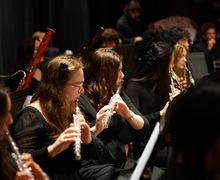Online classes offered by SU increase in number, variety
Every semester, Philip Arnold turns down more students from his online classes.
Arnold, an associate professor of religion who teaches the online class REL 101: “Religions of the World,” said many undergraduate students are interested in taking his course because they think it’s more convenient to not meet at a set time and that it gives them more free time.
“One of the illusions of the online class is that it is easier because you don’t have to meet face to face,” Arnold said.
But the number of students taking online classes isn’t just increasing for Arnold. Undergraduate students enrolled in online courses increased from about 173 in fall 2005 to 393 this fall, said Assistant Dean of Online Learning and Information Systems at Syracuse University’s University College Michael Frasciello, who helps administrate online classes offered by all the colleges at SU.
But these statistics are not officially reported by SU and are used by University College for programming and planning, Frasciello said.
Bryce Hammerton, a senior civil engineering major, took Arnold’s online course and another online philosophy course the summer after his freshman year. Although he enjoyed working at his own pace and the classes gave him more free time during the summer, Hammerton said the work could be harder to accomplish.
He said he probably could have done better in the philosophy course if he’d taken it on campus with a teacher present at every class to motivate him.
“I definitely prefer being in a classroom for really specific classes,” Hammerton said.
Despite losing valuable personal interactions with his instructors, Hammerton said he still recommends online courses as a way for students to fulfill academic requirements.
There has been a trend of more students taking electives through the College of Arts and Sciences to fulfill degree requirements. Undergraduate students tend to take more online classes in the summer so they can focus on their core classes during the fall and spring semesters, Frasciello said.
The average number of online classes per semester is usually around 35, but that number jumps to 40 in the summer, Frasciello said.
“Summer is an opportunity for us to help students fill in any special topic courses,” Frasciello said.
He also said he understands students take summer courses to decrease stress during the school year.
About two to five new courses from various colleges on campus become available for students to take during the summer each year, Frasciello said.
Plans are being developed to have some courses available for students to take during winter break — or “winter session” — in the near future, he said.
Although he is a major supporter of online classes, Frasciello said he believes they should not take away from students’ physical experiences in classrooms on campus.
“We place a very high value on the residential experience,” he said, “This includes having access to all of the faculty, resources and services that the university has to offer.”
Published on September 12, 2012 at 1:26 am
Contact Shannon: smhazlit@syr.edu





